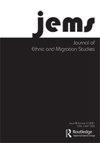Foreign labour migration in Nepal in relation to COVID-19: analysis of migrants’ aspirations, policy response and policy gaps from disaster justice perspective
IF 2.8
1区 社会学
Q1 DEMOGRAPHY
引用次数: 0
Abstract
ABSTRACT This paper examines the effectiveness of migration policies in dealing with the challenges that Nepalese migrants faced during this pandemic from a disaster justice perspective. Like in other periods of natural or human-made crises, the Nepal Government brought new policies and programmes to help the victims in their reintegration. In this context, this paper examines what policies and programmes worked and what did not work based on the findings of a large survey conducted among migrants and qualitative information collected during the implementation of a programme on reintegration. The paper highlights that understanding the social vulnerability of migrants is critical to devising policies that could benefit them in such disasters. It demonstrates that socially vulnerable groups are not only disproportionately affected by disasters and are less capable of resilience and recovery; they are also not supported well by public institutions like the government. This situation makes such migrants further vulnerable to poverty, physical exploitation and psychological stresses, which calls for policies and programmes that support them in preparedness and, in the event of a disaster, long-term recovery until they become resilient. This study shows that local governments are in a better position to target the ‘socially vulnerable’ and to implement reintegration programmes.与 COVID-19 有关的尼泊尔外国劳工移徙:从灾害公正角度分析移徙者的愿望、政策反应和政策差距
ABSTRACT 本文从灾害司法的角度出发,探讨了移民政策在应对尼泊尔移民在此次疫情中面临的挑战时的有效性。与其他自然或人为危机时期一样,尼泊尔政府制定了新的政策和计划来帮助灾民重返社会。在此背景下,本文根据在移民中开展的一项大型调查的结果以及在实施重返社会计划期间收集的定性信息,研究了哪些政策和计划有效,哪些无效。本文强调,了解移民的社会脆弱性对于制定可使他们在此类灾难中受益的政策至关重要。本文表明,社会弱势群体不仅受灾害影响尤为严重,抗灾和恢复能力较弱,而且得不到政府等公共机构的支持。这种情况使这些移民更容易遭受贫困、身体剥削和心理压力,这就需要制定政策和计划,支持他们备灾,并在发生灾害时支持他们进行长期恢复,直至他们具备抗灾能力。本研究表明,地方政府能够更好地针对 "社会弱势群体 "实施重返社会计划。
本文章由计算机程序翻译,如有差异,请以英文原文为准。
求助全文
约1分钟内获得全文
求助全文
来源期刊

Journal of Ethnic and Migration Studies
Multiple-
CiteScore
7.80
自引率
9.10%
发文量
157
期刊介绍:
The Journal of Ethnic and Migration Studies (JEMS) publishes the results of first-class research on all forms of migration and its consequences, together with articles on ethnic conflict, discrimination, racism, nationalism, citizenship and policies of integration. Contributions to the journal, which are all fully refereed, are especially welcome when they are the result of original empirical research that makes a clear contribution to the field of migration JEMS has a long-standing interest in informed policy debate and contributions are welcomed which seek to develop the implications of research for policy innovation, or which evaluate the results of previous initiatives. The journal is also interested in publishing the results of theoretical work.
 求助内容:
求助内容: 应助结果提醒方式:
应助结果提醒方式:


